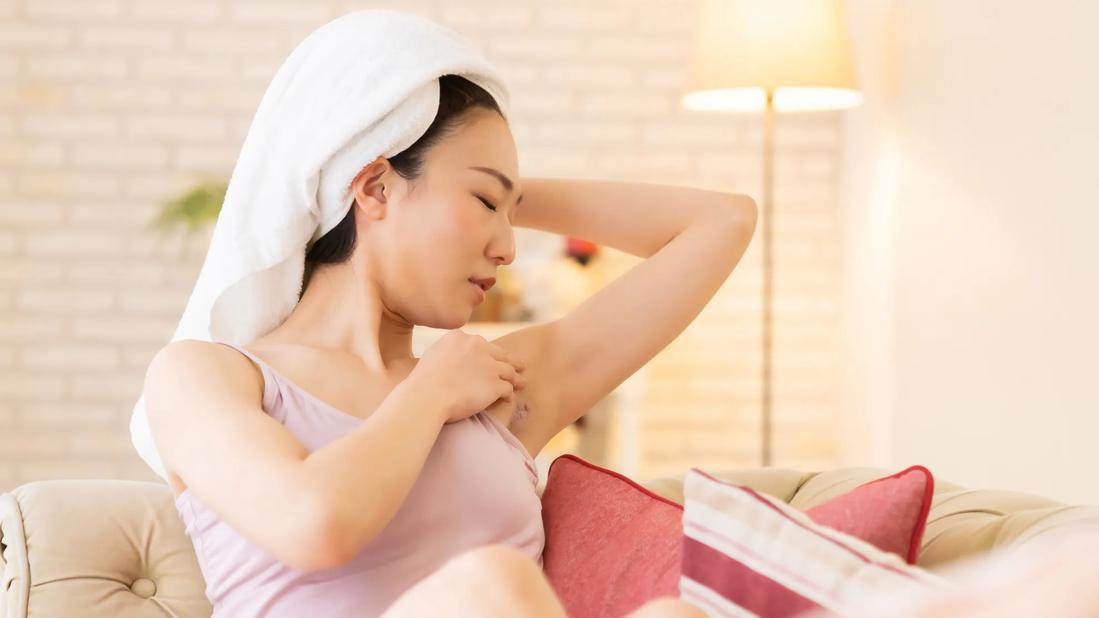Popping or prodding at these cysts could lead to infection

Image content: This image is available to view online.
View image online (https://assets.clevelandclinic.org/transform/43b35329-12ac-4dca-8c23-4dbfede76646/person-checks-underarm-growth-1399279747)
Person with towel wrapped around wet hair, examining growths in underarm area
Maybe you’ve been dealing with hidradenitis suppurativa (HS) for a while now. Or maybe you’re just starting to show signs of the chronic skin condition for the first time. Whatever your relationship with HS, you may be tempted to pick at those pesky cysts appearing on your armpits, groin or breast tissue.
Advertisement
Cleveland Clinic is a non-profit academic medical center. Advertising on our site helps support our mission. We do not endorse non-Cleveland Clinic products or services. Policy
But no matter how inflamed, irritated or itchy they might be, picking at your cysts is the worst thing you can do. Dermatology resident Taylor Bullock, MD, explains how picking or popping your cysts can worsen your condition, along with a few things you can do that are better at-home solutions.
HS isn’t your usual acne. The pits of hidradenitis suppurativa run so deep under your skin that they build tunnels with other cysts and fill up with a fluid mixture of blood and pus. If you force your cysts to pop, you could cause an infection that spreads to other areas of your skin or your bloodstream.
“I would not advise anyone to try popping their cysts,” emphasizes Dr. Bullock. “These cysts are located deep in the skin and could introduce bacteria into your body that could lead to an infection in your bloodstream.”
This can also lead to irreversible scarring and changes in pigmentation.
In most cases, HS cysts will naturally drain on their own because your skin is thin enough and will break open easily. Don’t let this discourage you: It’s part of the healing process.
But you want to make sure you’re taking care of these affected areas so they don’t continue to get infected. If your HS cysts pop, you should keep the area clean with antibiotic washes or rubbing alcohol, and keep the area bandaged until you’re able to see your doctor.
Advertisement
If you use rubbing alcohol to clean an inflamed cyst, make sure you only use that method sparingly. You could dry out your skin and cause more cysts to form if you rely on it too much.
If your cysts aren’t draining, try using warm compresses or warm water. Dr. Bullock recommends taking a warm shower and letting that water hit the affected area to help promote the drainage process.
At the first sign of cysts, you should see your doctor long before they start to drain.
“You should never wait until it gets to that point,” cautions Dr. Bullock. “As soon as you feel that you are getting any kind of pimples in your underarms or groin area, you should go see a board-certified dermatologist — especially if any of your at-home acne treatments aren’t working.”
If the affected area is increasingly inflamed or reddened and sensitive to pain, your healthcare provider may suggest a steroid injection to reduce inflammation and stop cyst formation. Other possible solutions may also include laser hair removal or laser surgery for more severe, persistent cases.
“There are many treatments that we use to prevent flares of HS and many other rescue treatments that people can use as soon as they notice a sign of a new flare,” shares Dr. Bullock. “Make sure you see your dermatologist to prevent flares and to have access to treatments for when you start to see a new cyst developing.”
Advertisement

Sign up for our Health Essentials emails for expert guidance on nutrition, fitness, sleep, skin care and more.
Learn more about our editorial process.
Advertisement
Both inflammatory conditions have varying triggers and symptoms
Keeping your skin dry, wearing the right clothes and investing in anti-chafe products can help minimize skin irritation
Working with a therapist, staying active and practicing mindfulness are just a few ways to help manage stress
Laser hair removal, laser surgery, excision and steroid injections are all potential treatment options
Use products that reduce inflammation without causing irritation and avoid fragrances, dyes and exfoliators
Nutrition plays an important role in managing this chronic inflammatory skin disease
Aloe vera, warm compresses and diet adjustments can help alleviate symptoms
Causes can include dry skin, eczema, psoriasis, sunburn and fungal infections
Prioritize your health by managing stress, strengthening your social connections and getting quality sleep
Bolsters, blankets, pillows and blocks can offer extra support, stability and comfort
Allergies, postnasal drip, asthma or reflux could be to blame for a cough that won’t quit